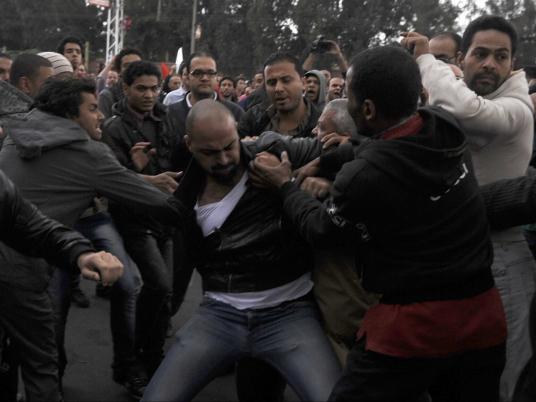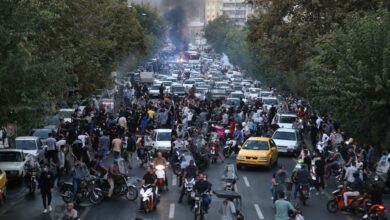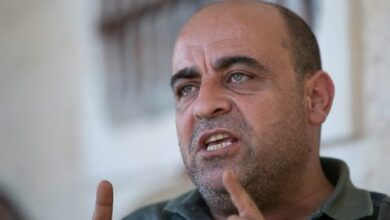
On 5 December, violent clashes raged for hours between supporters and opponents of President Mohamed Morsy, after the latter attacked a sit-in outside the presidential palace by protesters rejecting the constitutional declaration and a snap referendum on the constitution.
A total of 49 people were captured, beaten and kept overnight in makeshift holding cells as their captors interrogated them about their affiliations and the reason for their presence in the vicinity of the fighting.
But they were not arrested by police or military forces — according to numerous eyewitnesses and personal accounts, supported by video evidence, civilians affiliated with the ruling Muslim Brotherhood were the ones who kept them captive for hours under the eye of security forces.
Their protracted ordeal ended after members of the prosecution arrested the group, then ordered their release the next day in the absence of evidence of any wrongdoing on their part.
Some of those captured say they felt like prisoners of war. Others assumed they’d fallen into the hands of a private security apparatus.
Their testimonials leave one thing certain: that night, Islamist groups ran sovereign detention centers they’d created in the area around the presidential palace, imposing their authority on captured protesters as well as the security forces on hand.
Former diplomat Yehia Negm, computer engineer Mohamed Omar and Popular Socialist Alliance Party member Ramy Sabry were among the unfortunate group of 49 detained.
Images of bloodied faces, bruised eyes and hastily bandaged wounds quickly emerged, as did videos of the brutal interrogation process of which minors were not spared.
Their injuries still fresh, the three separately recounted their ordeal to Egypt Independent, and their tales support the same narrative, even crisscrossing at times in the stronghold fortified by the Islamist group that night.
A group of Morsy supporters ganged up on each of them, beating them severely then dragging each to the detention centers set up around the palace.
Omar was caught while delivering medical supplies to the field hospital set up at a gas station on the opposition side.
“They captured me, trashed the supplies and accused me of bringing medicine to the non-believers beating them up. They abducted me, I fell and they dragged me on the ground,” he recalls.
Omar says the mob beat him with anything their hands could reach, including a large billboard that landed on his head and cut him deeply.
When he tried to convince them to ease up, their response shocked him into silence. “I told them when the Prophet took over Mecca, he let non-believers go in peace. They told me ‘you are worse than the Prophet’s enemies in Mecca.’ I didn’t know what more to say.”
Drenched in blood, their hands and feet were tied up with a rough material that left visible marks, receiving minimal medical attention from Brotherhood-affiliated doctors, who were the only ones allowed in the area.
Even though ambulances were on the scene, the Brotherhood crowd often refused to let the injured go, and overwhelmed by the angry mob, ambulance workers had to comply, the three said.
All three witnessed one doctor objecting when two severely injured captives with stab wounds were not allowed into the ambulance.
“He lost his temper and shouted at them saying that neither religion nor ethics allows this, and that he can’t break his [Hippocratic] oath and leave these people to die,” according to Omar.
In this case, the mob gave in and sent the two to the hospital, but insisted on later returning them to the detention site.
Omar and the others say two members of the group rode in the ambulance with the two injured men to bring them back after they were stitched up at the hospital.
The ambulance was not the only state body succumbing to the will of the angry mob.
According to the three witnesses, police forces were not only unable to intervene and stop the attacks against protesters, but also took orders from the Brotherhood leaders on the scene.
A weak cordon of Central Security Forces was the only thing separating detainees from a larger, angrier pro-Morsy mob.
“I asked the police officer, ‘How can you let them beat us up while you’re standing there?’ He said, ‘I’m sorry, I’m following orders,” says Omar.
The three say the leader of the group was referred to as Dr. Alaa, and he frequently went inside the presidential palace and came back to continue assaulting them, a clear indication of coordination with the state.
After emerging from the palace, Omar says Alaa made sure to let everyone know he’s in control.
“He said, ‘I know who you are and they told me to let you go, but I won’t, because you’re educated and you should know better and be on our side,’” Omar says.
The three men say their captors openly attempted to pin charges on them.
They all heard a man introduce himself as lawyer Hany al-Dardiry, who urged the rest of the group to prepare a box of weapons as fake evidence to send off with the detainees to the prosecution office.
The witnesses say Dardiry convinced the rest to execute his plan after talking to Muslim Brotherhood leader Mohamed al-Beltagy via phone.
Sabry has pressed charges against Alaa, Dardiry, Beltagy, Muslim Brotherhood spokesperson Mahmoud Ghozlan, head of the Muslim Brotherhood Mohamed Badie and his deputy Khairat al-Shater, holding them responsible for his kidnapping and assault.
Sabry was snatched in the middle of the standoff between the two groups. He was dragged and beaten more intensely when his ID was checked and the group realized that he is Christian.
The small number of unarmed CSF had no chance in standing up to the mob. “They couldn’t have intervened — if they had tried, they would have been tied up and beaten with us,” he says.
During his interrogation, Sabry says, the group kept trying to force him to confess that he was a paid by a member of the former regime, threatening him with violence.
They imposed tight control over entry to the area, where only Brotherhood-affiliated media and doctors were allowed in. Families of the captured and others were denied entry.
Many videos of the police-like interrogations the group carried out were released by Brotherhood-affiliated media with headlines implying that the detainees had confessed to being affiliated with the old regime.
However, the videos only showed threats and brutal questioning tactics, met with constant denials by those being held captive.
In one video, a man in a suit and a beard is seen asking a badly beaten detainee who had paid him to protest, to which he replies that he’s a cleaning worker in a nearby building.
“We will leave you to these people outside if you don’t confess — they’ll kill you,” the man said as the victim sobbed.
Giving up on getting a confession, the man in the suit points toward the victim and orders his aids in an authoritative tone: “Search him.”
Former ambassador Yehia Negm was alarmed by the authority of the organized group that captured him.
“This is a precedent. I’ve never seen an Egyptian civilian capture another, tie him up, torture him, interrogate him and deprive him of his rights. It’s like a private intelligence or state security body that belongs to this group,” he says.
With a bloody eye and badly bruised face days after the attack, Negm recalls thinking that he was going to die when the mob first began beating him. He was captured in the middle of the clashes.
Negm says he was beaten with batons, punched and kicked from all directions, then the group put his head on the floor and jumped on it, then started jumping on his chest.
When he told the group they had no right to ask for his ID, they replied: “We can do whatever we want.”
Medical attention was also pending strict orders.
Negm says he asked a doctor to check his wounds, but the doctor refused since he had no orders to do so. After checking his ID and realizing he is a diplomat, the group quickly labeled him a traitor and an informer.
The three men also recall the inhumane treatment they received from a female doctor who arrived Thursday morning to tend to their injuries.
The doctor kicked the injured captives as they sat on the floor, called them pigs and undeserving of life. Eventually, an officer intervened and told her to leave if she can’t do her job.
That was the only time the police were able to stop an assault on those captured, they said.
The complete submission of the group’s members to their leaders was worrying, Negm says. “They haven’t just wiped out their minds — what’s worse is that we witnessed them ignoring their hearts and humanity,” Negm said.
He was even more concerned about the control the group had over police forces present on the scene.
“I saw weakness and I saw collusion. How can an officer take orders from a civilian and witness our beating? They were weak to the point of being crushed,” he says.
When the prosecution took the group to the police station the next day as suspects of assault and murder — among other accusations pinned on them — they were relieved, Negm says.
“It was the first time that we were actually happy to get arrested because it would get us away from the Nazi torture [chambers],” he said.
The three say they were treated well at the police station until their release the next day. However, they walked away with a frightening realization about the extent of the organization and reach of Muslim Brotherhood-affiliated groups in the street.
“It’s obvious that this group has an organization that has its own goals and has the tools to execute them. We witnessed this firsthand and this could be the start of a catastrophe for Egypt,” says Negm.




